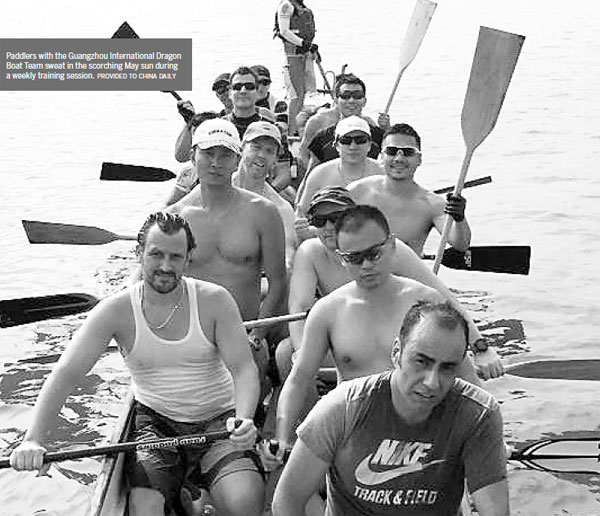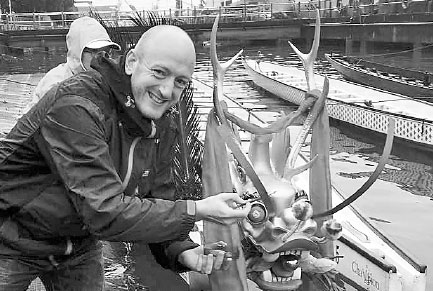Ancient Chinese sport making a splash around the world
Many expats are falling in love with dragon boat racing to learn about China and build teamwork
Dragon boat racing, an important folk culture activity especially during Duanwu Jie - the traditional Chinese Dragon Boat Festival - is becoming increasingly popular among non-Chinese people because of the way it inspires teamwork and the profound history and culture behind the activity.
David Butler, a British businessman based in Guangzhou in Guangdong province joined an international dragon boat team in the city in 2009 after considering it to be a "good window into South Chinese culture".
"I wanted to find out more about the city I live in and get to know more about the local people," said the 50-year-old team leader. "I have built a strong bond with my teammates when we train together for two hours every week, synchronize our rowing. It is a strong community in the boat. We've become friends and enjoy going out drinking and eating in our spare time."
He says there were few foreign paddlers in the club when he joined the Guangzhou International Dragon Boat Team, which was founded in 1999. Today, among the 40 or so active members, a dozen are foreigners hailing from 13 countries.
In addition to competitions in China, the team has raced in Malaysia, Thailand, the Philippines and Australia.
Ouyang Hui, the team's manager, joined in 2003 and has witnessed the way in which dragon boat racing has become popular around the world during the past 10 years.
She and her husband helped with training at dragon boat clubs in Hamburg in Germany and Amsterdam in the Netherlands when they toured Europe in 2013.
A friend of hers in New York has also sent her photos of dragon boat races on the Hudson River.
"Dragon boat racing is quite popular around the world now," Ouyang said. "And in the West, it's mostly Westerners, rather than Chinese people, who are participating."
Jon Hanlon, an American-Australian paddler with the international dragon boat team in Guangzhou, went to Adelaide in Australia for a race in April along with two of his teammates. They joined a team from Beijing for the event and competed in the 10th IDBF Club Crew World Championships.
He said it was interesting to see the many non-Chinese people walking through the streets of Adelaide with dragon boat paddles on their backs.
Hanlon joined the Guangzhou dragon boat team in April 2015 after a friend urged him to get involved.
"I wanted to try it because dragon boat racing is becoming a popular sport overseas and I thought it would be great to learn it in its native country of China," he said, adding that there are more than 15 dragon boat teams in Sydney alone.
For Hanlon, dragon boat racing is "unique" because it involves such large teams paddling together. Usually, there are 25 people in a dragon boat in international races.
He said the drumming is also a special feature that adds a feeling of theatre to the sport, and the boat itself looks quite special with the shape of the dragon's head and tail at the front and back.
"Most sports in the West originated for the purpose of leisure, rather than ceremony as this has in China," said the 39-year-old acupuncturist who is studying traditional Chinese medicine in Guangzhou.
"The history and culture behind dragon boat racing add interesting color to the sport."
Main Haddad, an industrial engineer working in Guangzhou, joined the international dragon boat team in April 2015, also after being invited to join by a friend. Haddad was especially excited because he comes from Jordan, a country where water resources are limited and people rarely participate in water sports.
Having been in China for 14 years, he had heard about Duanwu Jie and had watched dragon boat races often, but had never taken part.
"I have gradually discovered that it is a fascinating sport that has a long history and culture embedded into it," said the 43-year-old.
Haddad said club members often talk about where, when and how dragon boat racing started. And he got a chance to experience other aspects of Chinese culture, thanks to the sport, when he got to paint the dots on the eyes of the dragon when the club bought a new boat, symbolizing the beginning of its life.
"It is a trend for more and more foreigners to take part in dragon boat racing," he said. "The biggest charm of it is the amount of teamwork required. It is a team of 20 or more paddlers trying to be synchronized and united as one. Once you do it correctly, you feel amazing."
Huang Youbin, the Chinese coach of the international dragon boat team in Guangzhou, said he is not surprised about the popularity of dragon boat racing among foreigners.
Huang's birthplace is in the Gaoyao district of Zhaoqing city in Guangdong province, which is at the heart of the dragon boat racing culture. The 35-year-old businessman, who now works in Foshan, has been participating in dragon boat races for at least 15 years, under the influence of his father who used to take him to races when he was a child.
"For me, what's most attractive about dragon boat racing is the spirit of teamwork and striving for the best, and I guess that's also why it has attracted a lot of foreigners," Huang said. "A team can't win with one or two strong paddlers; the whole team must be united and synchronize their rowing. Once you take up the sport, you will discover that it is not playful but challenging, both physically and mentally."
Traditional dragon boat racing uses wooden boats and engages 50 paddlers, but in most races held nowadays, boats are made of fiberglass and take around 20 paddlers.
And traditional dragon boat racing involves many rituals, which few young Chinese people are familiar with, let alone the foreigners who take part, said Huang.
To help non-Chinese team members learn more about these traditional customs, Huang has been sharing his insights with teammates, such as telling them about some of the rituals, including the eye-dotting ceremony they held when the club bought its new boat in March.
"I feel it's my duty to spread the knowledge and encourage more people, whether they are Chinese or foreigners, to participate in dragon boat racing," Huang said.
xujingxi@chinadaily.com.cn
|
Paddlers with the Guangzhou International Dragon Boat Team sweat in the scorching May sun during a weekly training session. |
|
Stuart Cameron Nichols, a Scottish member of the Guangzhou International Dragon Boat Team, dots the eyes of the dragon head as part of the traditional celebration for the boat the team bought in March. Provided To China Daily |
(China Daily 06/09/2016 page8)



 Print
Print Mail
Mail



